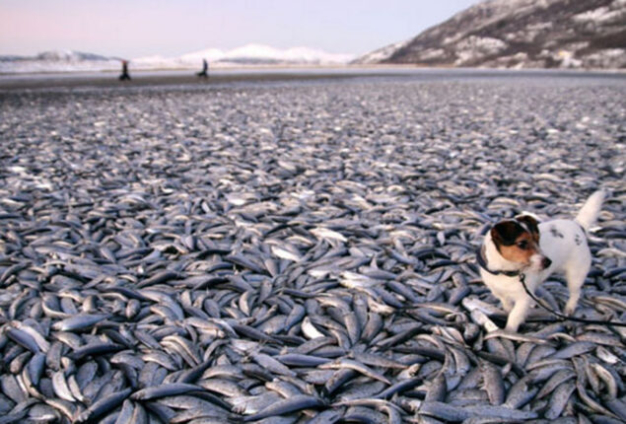Residents in a regional Australian town have woken to find millions of dead fish in their river.
The large-scale fish deaths were first reported on Friday morning in the New South Wales' (NSW) town of Menindee.
The state's river authority said it was a result of an ongoing heatwave affecting the Darling-Baaka river.
Locals say it is the largest fish death event to hit the town, that experienced another significant mass death of fish just three years ago.
In a Facebook post, the NSW Department of Primary Industries (DPI) said the heatwave put "further stress on a system that has experienced extreme conditions from wide-scale flooding".
Heatwaves have become more frequent, more intense, and last longer because of human-induced climate change. The world has already warmed by about 1.1C since the industrial era began and temperatures will keep rising unless governments around the world make steep cuts to emissions.

Speaking to the BBC, Menindee resident Graeme McCrabb described the deaths as "surreal".
"It'll probably be a bit more confronting today," he said, as he warned that locals were anticipating that even more fish would die as the already decomposing fish sucked more oxygen from the water.
Around 500 people live in the town in far-west New South Wales. The Darling-Baaka river is a part of the Murray Darling Basin, Australia's largest river system.
The NSW DPI also said that the fish deaths were "distressing to the local community", a sentiment echoed by Mr McCrabb.
"You can just imagine leaving a fish in your kitchen to rot with all the doors shut and no air conditioner, and we've got millions of them."
The temperature in Menindee was expected to reach 41C on Saturday.
He added that locals in the regional town rely on the Darling-Baaka for water supplies, "we use the river water for washing and showering in so people won't be able to use that water for those basic needs again," he said.
"Over time those people won't be able to access that water for domestic use which is just shameful".
This week's fish deaths throws a light on the troubles facing the Murray Darling Basin. Drought and increased human use has impacted the health of the Murray Darling ecosystem.
The Murray Darling Basin authority said agriculture, industries and communities have used water from the river system which has resulted in less water flowing through the river.
It also said the Basin is prone to extreme weather events and has a highly variable climate that makes it vulnerable to both fires and droughts.
In 2012, a plan worth A$13bn (£8.45bn at the time) was implemented to try and stop the river from drying up and returning it to a healthier level.
The NSW DPI said it will work with federal agencies to respond to the latest incident, and to find the underlying causes of the deaths.
Latest Stories
-
Duct-taped banana artwork sells for $6.2m in NYC
10 mins -
Arrest warrants issued for Netanyahu, Gallant and Hamas commander over alleged war crimes
13 mins -
Actors Jonathan Majors and Meagan Good are engaged
19 mins -
Expired rice saga: A ‘best before date’ can be extended – Food and Agriculture Engineer
27 mins -
Why I rejected Range Rover gift from a man – Tiwa Savage
27 mins -
KNUST Engineering College honours Telecel Ghana CEO at Alumni Excellence Awards
1 hour -
Postecoglou backs Bentancur appeal after ‘mistake’
1 hour -
#Manifesto debate: NDC to enact and pass National Climate Law – Prof Klutse
1 hour -
‘Everything a manager could wish for’ – Guardiola signs new deal
1 hour -
TEWU suspends strike after NLC directive, urges swift resolution of grievances
2 hours -
Netflix debuts Grain Media’s explosive film
2 hours -
‘Expired’ rice scandal: FDA is complicit; top officials must be fired – Ablakwa
3 hours -
#TheManifestoDebate: We’ll provide potable water, expand water distribution network – NDC
3 hours -
IPR Ghana@50: Pupils educated to keep the environment clean
3 hours -
PenTrust CEO named ‘Best Pensions CEO’, company wins ‘Scheme Administrator Award’ at Ghana Accountancy & Finance Awards 2024
3 hours

